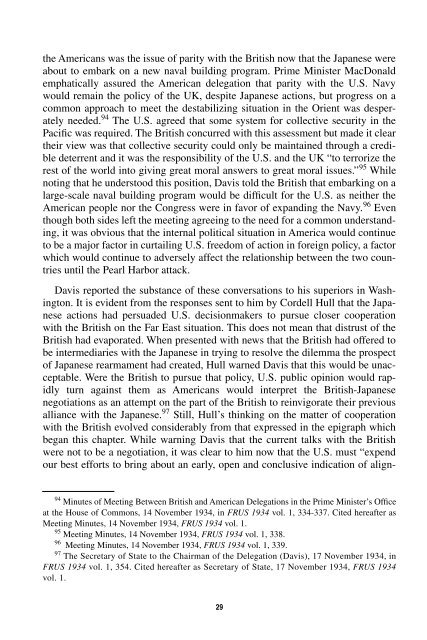COURTING A RELUCTANT ALLY - National Intelligence University
COURTING A RELUCTANT ALLY - National Intelligence University
COURTING A RELUCTANT ALLY - National Intelligence University
- No tags were found...
You also want an ePaper? Increase the reach of your titles
YUMPU automatically turns print PDFs into web optimized ePapers that Google loves.
the Americans was the issue of parity with the British now that the Japanese wereabout to embark on a new naval building program. Prime Minister MacDonaldemphatically assured the American delegation that parity with the U.S. Navywould remain the policy of the UK, despite Japanese actions, but progress on acommon approach to meet the destabilizing situation in the Orient was desperatelyneeded. 94 The U.S. agreed that some system for collective security in thePacific was required. The British concurred with this assessment but made it cleartheir view was that collective security could only be maintained through a credibledeterrent and it was the responsibility of the U.S. and the UK “to terrorize therest of the world into giving great moral answers to great moral issues.” 95 Whilenoting that he understood this position, Davis told the British that embarking on alarge-scale naval building program would be difficult for the U.S. as neither theAmerican people nor the Congress were in favor of expanding the Navy. 96 Eventhough both sides left the meeting agreeing to the need for a common understanding,it was obvious that the internal political situation in America would continueto be a major factor in curtailing U.S. freedom of action in foreign policy, a factorwhich would continue to adversely affect the relationship between the two countriesuntil the Pearl Harbor attack.Davis reported the substance of these conversations to his superiors in Washington.It is evident from the responses sent to him by Cordell Hull that the Japaneseactions had persuaded U.S. decisionmakers to pursue closer cooperationwith the British on the Far East situation. This does not mean that distrust of theBritish had evaporated. When presented with news that the British had offered tobe intermediaries with the Japanese in trying to resolve the dilemma the prospectof Japanese rearmament had created, Hull warned Davis that this would be unacceptable.Were the British to pursue that policy, U.S. public opinion would rapidlyturn against them as Americans would interpret the British-Japanesenegotiations as an attempt on the part of the British to reinvigorate their previousalliance with the Japanese. 97 Still, Hull’s thinking on the matter of cooperationwith the British evolved considerably from that expressed in the epigraph whichbegan this chapter. While warning Davis that the current talks with the Britishwere not to be a negotiation, it was clear to him now that the U.S. must “expendour best efforts to bring about an early, open and conclusive indication of align-94 Minutes of Meeting Between British and American Delegations in the Prime Minister’s Officeat the House of Commons, 14 November 1934, in FRUS 1934 vol. 1, 334-337. Cited hereafter asMeeting Minutes, 14 November 1934, FRUS 1934 vol. 1.95 Meeting Minutes, 14 November 1934, FRUS 1934 vol. 1, 338.96 Meeting Minutes, 14 November 1934, FRUS 1934 vol. 1, 339.97 The Secretary of State to the Chairman of the Delegation (Davis), 17 November 1934, inFRUS 1934 vol. 1, 354. Cited hereafter as Secretary of State, 17 November 1934, FRUS 1934vol. 1.29
















